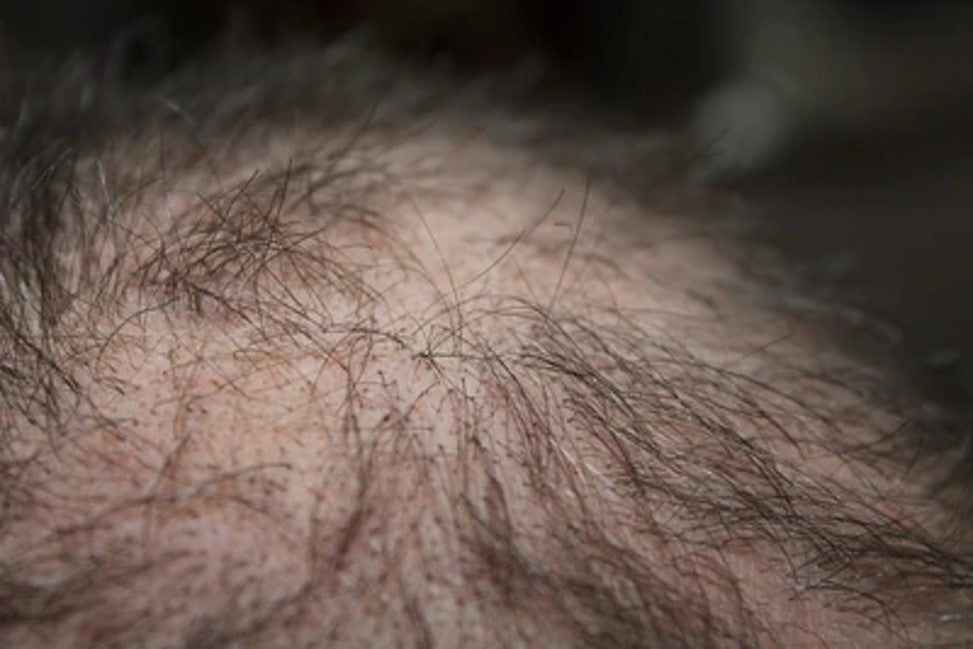Lupus is a disease that occurs when your body’s immune system attacks your own tissues and organs. Inflammation caused by lupus can affect many different body systems including your joints, scalp, skin, kidneys, bloods cells, brain, heart, and lungs. In this article we focus ourselves on lupus hair loss and the effect on the scalp. The following topics will be covered:
- Can lupus cause hair loss?
- What type of lupus causes hair loss?
- How to stop lupus hair loss?
- Lupus hair loss treatments
CAN LUPUS CAUSE HAIR LOSS?
Lupus hair loss is a condition that occurs due to the widespread of inflammation that usually involves your skin on the face and scalp. Lupus can cause the hair on your scalp to gradually thin out and a few people might even lose clumps of hair. Lupus hair loss can appear on the eyebrows, eyelashes, beard, and body hair.
According to research two types of lupus hair loss can occur. Scarring and non-scarring hair loss. Non-scarring hair loss is the result of the inflammation that can develop around the scalp and hair follicles.
WHAT TYPE OF LUPUS CAUSES HAIR LOSS?
Scarring hair loss is the other type of lupus alopecia. These types include chronic cutaneous or discoid lupus erythematosus and subacute cutaneous lupus. Lupus alopecia results from skin lesions on the scalp. The skin lesions can be red, thick, and scaly and typically do not itch or hurt. These lesions damage hair follicles and leave behind bald patches that are round.
- Chronic cutaneous lupus hair loss: discoid lupus lesions are often red, scaly, and thick and do not hurt or itch. Over time, these lesions can produce scarring and skin discoloration. Discoid lesions that than occur on the scalp may cause hair to fall out.
- Subacute cutaneous lupus (SCLE) causes skin sores or rashes. Some prescription drugs may increase your risk to get it and there is no cure on the market. But treatments can help you to manage symptoms such as hair loss.
HOW TO STOP LUPUS HAIR LOSS?
Lupus hair loss may be reversible if you don’t have discoid lesions. When you want to stop lupus hair loss, it is important that you must be able to control the disease. That’s why we provide you with five tips against lupus hair loss and how to help you cope with your hair loss:
1. Avoid unnecessary sun exposure. The sun can trigger lupus flares and discoid lesions. You should be able to protect your skin and head when outdoors. Consider wearing a hat or applying sunscreen.
2. Eat a healthy diet. You can eat a diet rich in vitamins and nutrients that may help to slow down your hair loss. Vitamins for hair growth include biotin, vitamin C, vitamin D, iron, copper, and Zinc. It is possible to get multiple nutrients and vitamins in your body by using hair growth supporting supplements.
3. Limit stress as much as you can. Certain factors can trigger a lupus flare and even worsen lupus hair loss. Stress is a known trigger for hair loss.
4. Get plenty of rest and sleep eight to nine hours a night. You can also sleep on a satin pillowcase to protect your hair from further breakage.
5. Avoid harsh care treatments such as colouring and heat until you’re able to get the disease under control. You can use a treatment to better your hair health and to try and stop lupus symptoms of hair loss.
LUPUS HAIR LOSS TREATMENTS
There are no lupus hair loss treatments that currently work effectively yet. But there is a treatment for healthy hair and a treatment for healthy scalp. The treatment for beautiful and healthy hair is a combination of a smooth shampoo and nourishing conditioner. By using them together you can gently nourish your hair and stimulate hair growth.
The healthy scalp treatment is a combination of an exfoliating shampoo and nourishing mask. This treatment combats dandruff, flakes, and itching. It exfoliates the scalp and removes impurities. It is the perfect treatment for a cleaner scalp.



